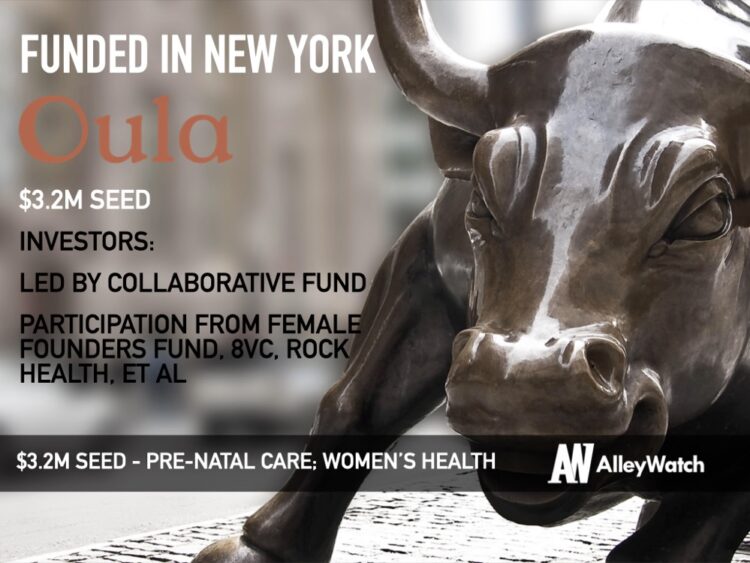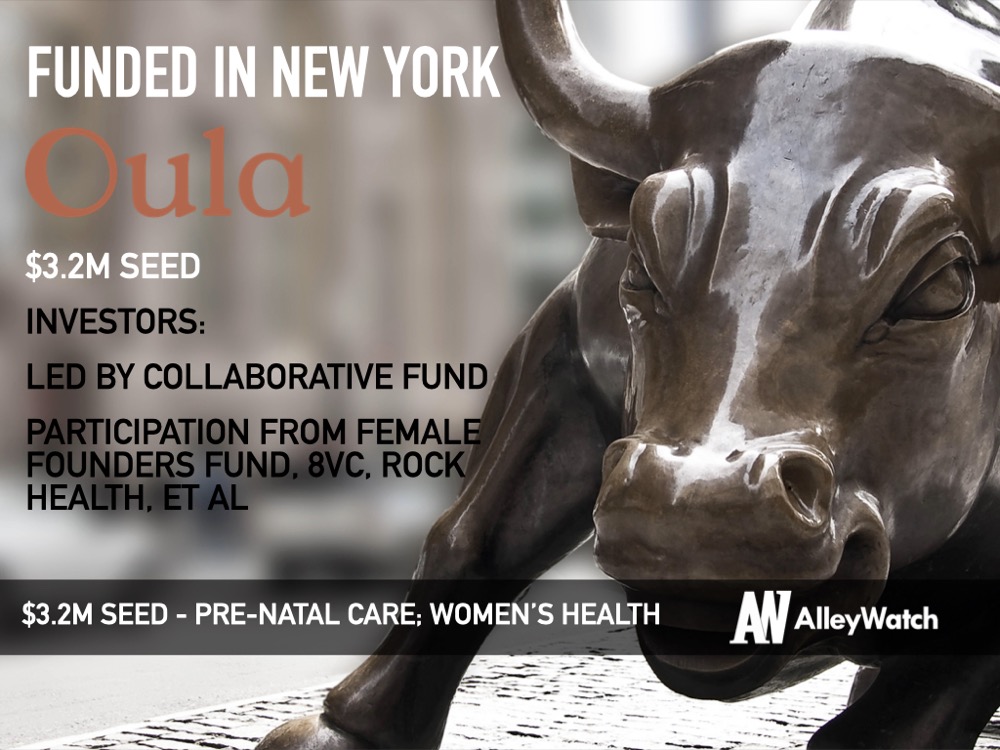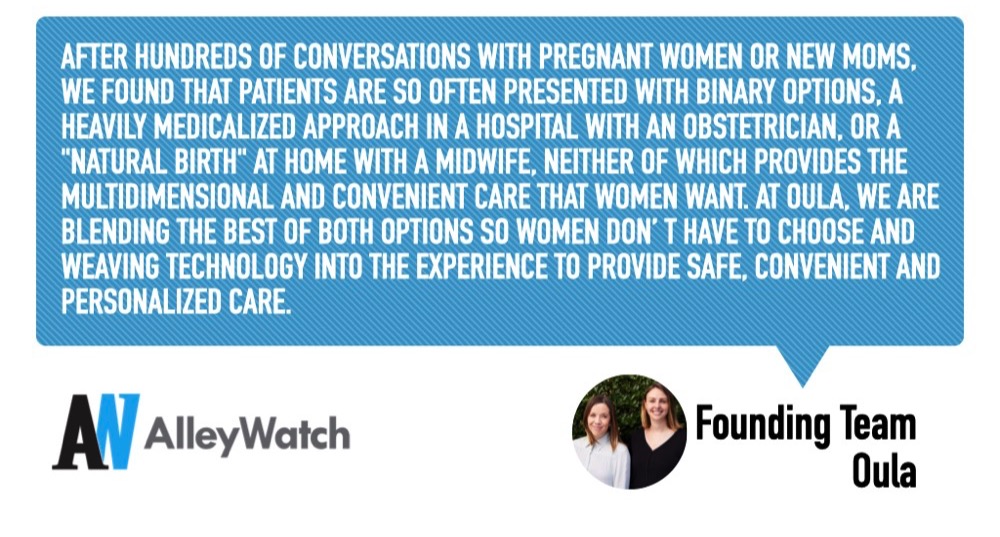Approximately 4 million children are born each year in the US but maternity care hasn’t really evolved in the last 50 years. Expectant mothers are limited to the impersonal hospital experience or natural birth. Oula, the operator of modern maternity care centers, fills the gap between the two. Blending obstetrics and midwifery, Oula serves as a white-glove concierge for the pregnancy experience, an experience which can be isolating and daunting – both before childbirth and postpartum. The company’s first state-of-the-art prenatal care clinic will open early next year in Brooklyn Heights along with the company’s first birthing center in Manhattan with plans to further expand, initially focusing on the city.
AlleyWatch caught up with Founders Adrianne Nickerson and Elaine Purcell to learn more about the genesis for Oula, the company’s experience of building a brick and mortar business in the middle of the pandemic, and the company’s recent seed round.
 Who were your investors and how much did you raise?
Who were your investors and how much did you raise?
We were oversubscribed for our seed round and ended up raising $3.2 million. The round was led by Collaborative Fund with a syndicate of consumer VCs, healthcare VCs, and angel operators, including Female Founders Fund, 8VC, and Rock Health, among others.
Tell us about the product or service that Oula Health offers.
Oula is a modern maternity center combining the best of obstetrics and midwifery care. Our first prenatal care clinic opens in early 2021 where women can access in-person and virtual appointments throughout prenatal care and postpartum. The Oula app helps women navigate key decisions, build their prenatal care plan, and message their care team between visits.
What inspired the start of Oula Health?
Like many women in their 30s, we were starting to plan for kids and trying to figure out how to balance that with the rest of our busy lives. We turned to our friends who had already navigated the terrain and were pretty disappointed to learn about their experiences. We expected pregnancy to be this exciting and hopeful time, and yet we kept hearing women describe how isolating it felt and how unprepared they were for childbirth and postpartum. After having spent time rebuilding the care experience in oncology and primary care, it seemed obvious to us that there had to be a better way. We selfishly wanted to build a better experience for ourselves but also wanted it to be something that improved the experience for all women. After months of research and conversations, we realized the answer required rebuilding maternity care from the ground up. Women needed a collaborative care team that actually listened to what was important to them and they needed support that focused on their wellbeing as much as their babies.
How is Oula Health different?
After hundreds of conversations with pregnant women or new moms, we found that patients are so often presented with binary options, a heavily medicalized approach in a hospital with an obstetrician, or a “natural birth” at home with a midwife, neither of which provides the multidimensional and convenient care that women want. At Oula, we are blending the best of both options so women don’ t have to choose and weaving technology into the experience to provide safe, convenient, and personalized care.
What market does Oula Health target and how big is it?
The overall market opportunity is huge – maternity care costs consumers and health insurers $126 billion each year. With over 125,000 births each year in the 5 boroughs alone, we see New York City as the ideal market to launch.
What’s your business model?
Ensuring all women have access to care was critical to our business model. We are partnering with commercial health plans and Medicaid plans to cover our services.
How has COVID-19 impacted the business?
Virtual care was on our roadmap but COVID-19 definitely accelerated the need to have it up and running before we opened our clinic doors. We also planned to launch with group care and in-person events that are on hold for the time being. More broadly, it has been interesting to see how COVID-19 has impacted women’s perceptions of midwifery care and birth centers. We feel an increased demand for what we are building as a result of these changes in consumer preferences.
What was the funding process like?
We had the chance to meet Lily from Collaborative Fund right before the city shut down. It was a couple of months before we started fundraising but we credit our relatively quick process to having built that relationship before we needed the capital.
What are the biggest challenges that you faced while raising capital?
Raising for a brick-and-mortar business during COVID-19 presented some unique challenges. Funds that would typically invest in CapEx heavy businesses had to reserve capital for their existing portfolio companies and funds new to brick-and-mortar were more hesitant to take bets. Like all early-stage fundraising, it is about finding the right people who believe in what you are building and we feel lucky to have had an oversubscribed round in the midst of this crazy time.
What factors about your business led your investors to write the check?
It was a combo of the business and our team. We spent months having conversations with women, clinicians, and healthcare execs before landing on what is now Oula. We knew the space and our consumer inside and out, and that helped investors who were already excited about the space get conviction on the business opportunity. On top of that, as cofounders we have over two decades of experience in healthcare and know the ins and outs of navigating building business in a highly regulated market.
What are the milestones you plan to achieve in the next six months?
We have many! and we have an awesome team behind us to get this all done. We’re launching virtual visits next month for women trying to conceive or early in their pregnancy. Then our prenatal care clinic opens this winter in Brooklyn Heights, allowing us to combine virtual and in-person care to safely support the pregnancy journey. Then we have a lot of work to prepare for the launch of our birth center in Manhattan. All of this will be powered by our app, also launching this winter, driving better connection points between patients and our providers.
We’re launching virtual visits next month for women trying to conceive or early in their pregnancy. Then our prenatal care clinic opens this winter in Brooklyn Heights, allowing us to combine virtual and in-person care to safely support the pregnancy journey. Then we have a lot of work to prepare for the launch of our birth center in Manhattan. All of this will be powered by our app, also launching this winter, driving better connection points between patients and our providers.
What advice can you offer companies in New York that do not have a fresh injection of capital in the bank?
It is okay to be in a time of maintenance and not growth. And with that mindset, focusing on your core clients or users will serve you well.
Where do you see the company going now over the near term?
In the near term, we want to help the whole industry progress so that the Oula way of delivering care becomes the new standard that all pregnant individuals can expect regardless of whether or not they are in a city with an Oula clinic. The key to making this happen will be partnering with large health systems and health insurers that influence care across the country. We firmly believe the fastest way to change care is by aligning incentives across consumers, insurers, and providers. We are in the midst of these conversations right now and are excited to push them forward.
What’s your favorite outdoor dining restaurant in NYC
Fradei Bistro in Fort Greene! They change their menu weekly so you can consistently try new Italian/French dishes!
You are seconds away from signing up for the hottest list in New York Tech! Join the millions and keep up with the stories shaping entrepreneurship. Sign up today





